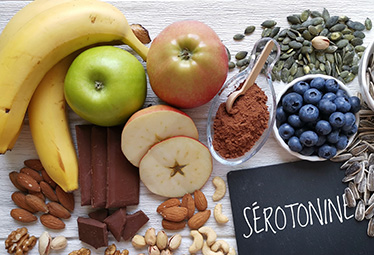 It is often referred to as the happiness hormone. However, serotonin is much more than just a mood regulator. This essential neurotransmitter plays a role in many vital bodily functions, such as sleep, digestion, blood circulation and pain perception. With age, its levels can decrease, leading to mental and physical fatigue. It is therefore important to understand its role and know the natural ways to support its production.
It is often referred to as the happiness hormone. However, serotonin is much more than just a mood regulator. This essential neurotransmitter plays a role in many vital bodily functions, such as sleep, digestion, blood circulation and pain perception. With age, its levels can decrease, leading to mental and physical fatigue. It is therefore important to understand its role and know the natural ways to support its production.
What is serotonin?
Serotonin is a molecule produced mainly in the gut – around 90% – and to a lesser extent in the brain. It acts as a chemical messenger that transmits information between neurons and helps maintain the body's balance. It regulates mood, promotes restful sleep, helps calm anxiety and even plays a role in regulating appetite. It also plays a role in blood vessel contraction and pain modulation.
A balanced serotonin level is essential for mental well-being and physical health. A deficiency can result in a tendency to depression, increased irritability, digestive problems and frequent insomnia.
Serotonin and mood
This is undoubtedly its best-known function. Serotonin helps regulate mood and emotional stability. When produced in sufficient quantities, it promotes a state of calm and serenity. Conversely, a lack of serotonin is associated with low mood, nervousness and sometimes depression. This is why some antidepressants work by increasing the availability of serotonin in the brain.
A key player in sleep
Serotonin plays an essential role in sleep quality because it is the precursor to melatonin, the hormone that regulates the sleep-wake cycle. When serotonin reserves are low, it can become more difficult to fall asleep and more common to wake up during the night. With age, natural secretion decreases, which explains why many seniors experience lighter and less restful sleep.
Its role in digestion and circulation
It is no coincidence that serotonin is produced mainly in the intestine: it plays an active role in the proper functioning of the digestive system and the regulation of bowel movements. It also plays a role in the contraction of blood vessels, helping to maintain healthy circulation. Some studies have shown that serotonin may also reduce the perception of chronic pain, particularly in inflammatory disorders.
How to naturally boost serotonin
There are simple and accessible ways to support serotonin production without medication. The first habit to adopt is exposure to natural light. Daylight stimulates the production of this molecule in the brain, which is why it is important to go outside every day, even for just half an hour, even in winter. A daily walk, preferably in the morning, is an excellent way to combine physical activity and exposure to light.
Diet also plays an essential role. Serotonin is made from tryptophan, an amino acid found in certain foods such as eggs, dairy products, oily fish, bananas, nuts and dark chocolate. Eating these foods in combination with complex carbohydrates, such as wholemeal bread or brown rice, promotes the absorption of tryptophan.
Regular physical activity is also a valuable ally. Moderate exercise – walking, gentle cycling, yoga – naturally increases serotonin levels and promotes a feeling of relaxation and well-being. Even short sessions of 20 to 30 minutes are enough to feel a positive effect.
Finally, relaxation, deep breathing and meditation help reduce stress, which depletes serotonin reserves. Taking time each day to sit down and breathe calmly can really make a difference.
When to seek medical advice
If, despite your best efforts, you experience persistent sadness, loss of pleasure, intense fatigue or worsening sleep problems, it is important to talk to your doctor. These signs may reflect a deeper imbalance that requires medical and psychological support.
Serotonin is a real pillar of our mental and physical well-being. With a few simple steps, such as enjoying natural light, exercising regularly, eating a healthy diet and using relaxation techniques, you can support its natural production and maintain your mood, sleep and overall health.



